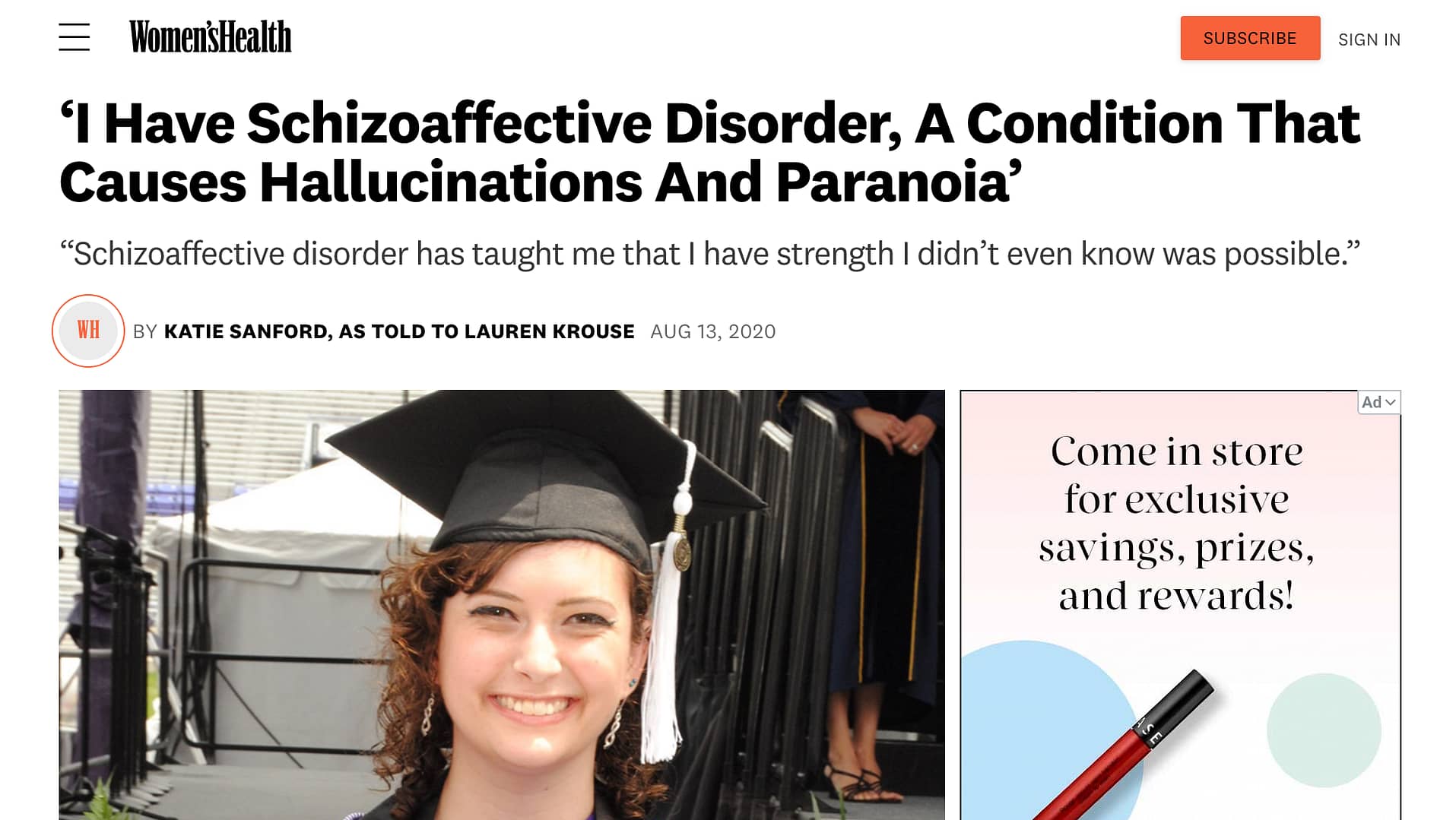- Adapting to life with schizoaffective disorder, Cognitive Symptoms, Disorganized symptoms, Hallucinations, Negative Symptoms, Recovery, Schizoaffective Disorder, Schizophrenia
Adapting to life with schizoaffective disorder (part 3) – symptoms
I didn’t know what to expect. Deep down I had suspected that it was schizophrenia, but getting confirmation from my doctor made it real. I was scared. None of the stories I knew about schizophrenia ended with someone being symptom-free. I sat in the car after my doctor’s appointment with my head spinning. Were the hallucinations going to get worse? Was I going to become delusional? Would I largely lose touch with reality? At that moment, I decided that that was not going to happen to me. It was more denial than anything else, but I had my mind set on it. I was not going to lose my life…
-
Adapting to life with schizoaffective disorder (part 2) – Stigma
That’s me in the photo – multiple ear piercings, blue streaks in my bangs, looking confident. It was my high school graduation and I had done it. A year earlier, I would never have doubted that I would graduate, but a few weeks before I started my senior year, my world came crashing down around me when I was diagnosed with schizoaffective disorder. I thought my life might be over. But mostly, I was afraid of what others would think and how they would treat me, and I knew my parents were afraid of the stigma I might face as well. Convinced that I was different I fully expected people…
- Adapting to life with schizoaffective disorder, Medication, Recovery, Schizoaffective Disorder, Schizophrenia
Adapting to life with schizoaffective disorder (part 1) – Self-acceptance
“It’s looking to be schizophrenia.” My heart skipped a beat when my doctor said those words. Part of me felt calm because it confirmed what I had suspected, but in the car I came apart. I didn’t know any success stories of people who went on to live perfectly normal lives. All I knew were stereotypes and stories with poor outcomes. I swore to myself that that would not happen to me. The first year The first year of my diagnosis was a mixture of struggle and denial. I was highly motivated to take my medication because I knew it was key in reaching and maintaining stability. I hated the…
-
Schizophrenia – Taking the power from the word
For a very long time, I lived in a cloud of shame and fear brought on by my diagnosis of schizoaffective disorder. I made my parents promise not to share it with my extended family. For a bit, I even kept my diagnosis from my brother, who was away at college. By the end of the first year with my disorder, less than 20 people knew, including my parents and doctors. I was so afraid of the power of the word schizophrenia. Fighting the fear I was afraid that the word alone would make people see me in a different light. Could it wash away years of friendship? What did…
-
Life as a high functioning person with schizoaffective disorder
There are a few different ways to define what high functioning means for someone with schizophrenia – the ability to work full-time or function as a stay-at-home caregiver or as a full-time student, good interpersonal skills and relationships, and just generally being able to function in society the majority of the time. Throughout the course of my life with schizoaffective disorder, I have always been considered high functioning. But high functioning doesn’t mean my life is normal or even symptom-free. There still may be symptoms Residual symptoms are common in people with schizophrenia and schizoaffective disorder even with medication and can occur frequently. For me, this occurs as disorganized thoughts…
-
Supporting a loved one who has been diagnosed with schizophrenia
That moment where you hear the words “schizophrenia.” Heart wrenching, gut turning news. What do you do? How do you help someone fight such a complex illness? What’s going to happen to them? And what is your own life going to be like now? In no way do I have all the answers, and this is by no means an exhaustive list, but here are a few things you can do to help a loved one who has been diagnosed with schizophrenia or schizoaffective disorder. Educate yourself Schizophrenia is a complex illness that affects both the brain and mental health. Medication for schizophrenia can also be confusing. One of the…
-
Auditory Hallucinations – A Closer Look
We talked about visual hallucinations in Visual Hallucinations – A Closer Look, so now it’s time to dig into auditory hallucinations. One summer day in 2008, I was getting ready for the day. I was home alone with no music or TV. From the back corner of my bedroom behind me, I heard a snicker. It was short, but crystal clear. A man’s voice. Laughing at me. Days passed, and then I heard the sound of a guitar being strummed just once. I began to hear all sorts of other strange sounds, like the creaking of floorboards under carpet at night. I could hear each slow but purposeful footfall, as…
- Anxiety, Depression, Eating Disorders, Medication, Obsessive Compulsive Disorder, PTSD, Recovery, Schizoaffective Disorder, Schizophrenia
Preparedness for people with mental illnesses
It can be hard to feel prepared for anything when you’ve got a mental health disorder. Below is a list of things that I’ve done to prepare myself for events ranging from forgetting the details of my medications to the possibility of being unable to make decisions for myself. Keep a list of medications with important personal information I take many medications for both mental and physical issues daily, but it was hard to keep track of them. To make that easier, I started carrying a list with me in my wallet. This way, when doctors asked about my medication, I could just give them the list. It turned out…
-
Reality Checking
During a question and answer session after myself and another speaker shared our stories to educate sheriff officers during Crisis Intervention Training, one of the officers brought up that he has a friend with schizophrenia and his friend will sometimes ask him if he heard or saw something, which is a tool many of us refer to as reality checking. The officer continued, saying he was usually able to confirm the experience as real, but then he asked, “what do I do if it isn’t real?” I cannot stress enough how important this question is, and I have the feeling this is a question many people have, and may or…
-
Visual Hallucinations – A Closer Look
The picture above depicts a fluffy grey cat crouching on the branch of a tree, horizontal to the camera. Kind of Cheshire-cat-like. The cat’s tail hangs off the branch. She’s a little hazy, but she’s not a ghost; she’s very much there. Her eyes are pale, but confident and reassuring. You don’t see her do you? I don’t see her there anymore either, though I can see exactly where she was and I can picture her in my head. I took this photo during my worst episode to date. It was my senior year of college, and my mind pulled out all the stops. I had symptoms that I had…


